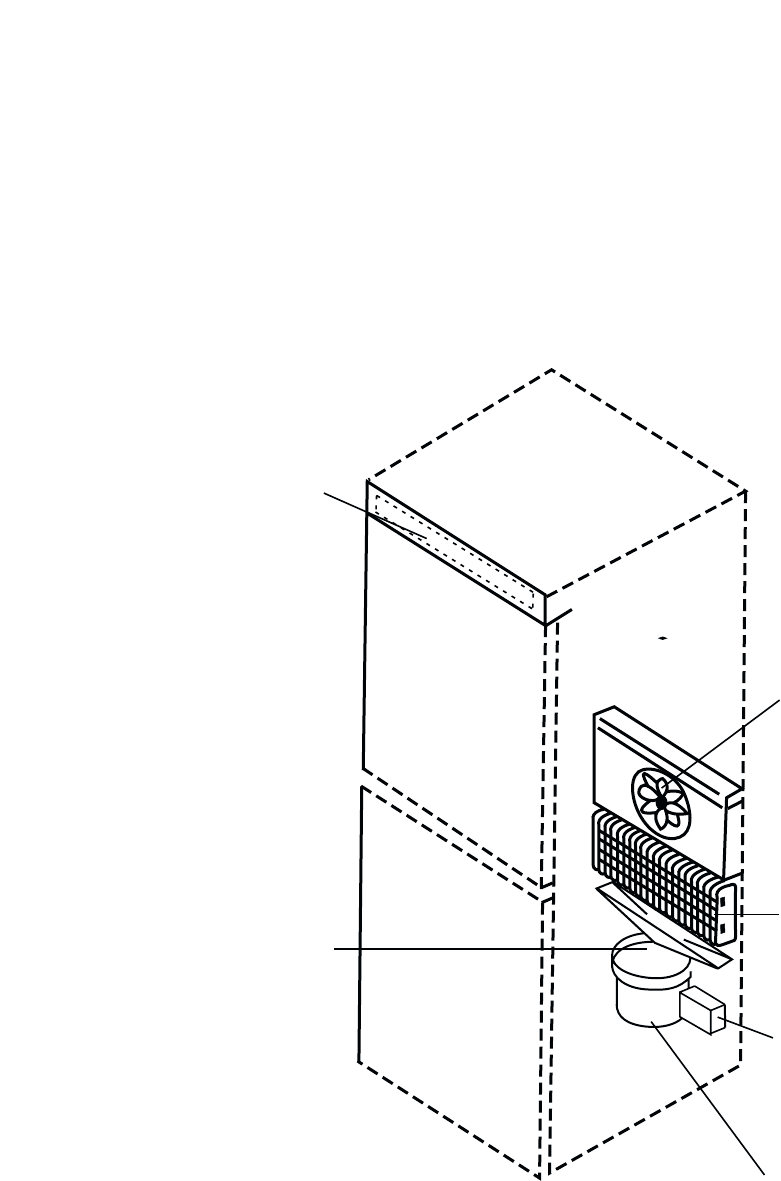
8
Normal Operating Sounds
The advanced design of today’s frost free appliances means you hear unfamilar noises during everyday
operation. The diagram below describes some of the noises you may hear. These are quite normal and your
appliance is operating correctly
The thermostat control will
click when starting or
stopping the compressor.
Defrost water drips into the
drain pan during the defrost
cycle.
The automatic defrost timer
sounds like an electric clock
and clicks in and out of the
defrost cycle.
The fan circulates cold air to
cool the refrigerator and the
freezer compartment and
sounds like air blowing or a
whirring sound.
The flow of refrigerant
through the freezer cooling
coil makes a gurgling noise.
Water dropping on the defrost
heater causes a hissing or
popping sound during the
defrost cycle.
The compressor will make a
humming or pulsating sound
while
operating.
9
• Keep the time between buying chilled food and
placing it in your fridge as short as possible. Tests
showed that the temperature of 1 litre of orange
juice rose to 22°C in an hour between the
supermarket and home. It then took 11 hours to
get down to 7°C in the refrigerator.
• Keep the refrigerator door closed as much as
possible.
• Do not push food together too much, try to allow
air to circulate around each item.
• Cool cooked food as quickly as possible but do
NOT place in the refrigerator until cool. (Leave
food in a place as cool as possible in order that it
can then be placed in the refrigerator as soon as
possible).
• Do NOT mix raw and cooked meat, they must be
in separate containers. Take care not to let the
meat juices drip onto other food. If the meat does
drip, remove everything and clean thoroughly.
• Do not store food uncovered.
• The best way to defrost food is to put it in the
refrigerator to thaw slowly.
• Remove suspect food from your refrigerator and
clean (refer to “Maintenance and Cleaning).
• Never allow spillages to dry and harden.
• Ensure that food placed in the freezer is dated
and labelled and used in date order to ensure
that food is consumed at its best.
• It is important that food is used before its “best
before” date.
• Store eggs in the egg rack provided in the
refrigerator door. Discard any broken or chipped
eggs.
• Regularly check the refrigerator door seal to
ensure that it is clean and free from debris.
• Always wash your hands with soapy water and
dry them with a clean towel before handling food.
• Keep work surfaces clean and avoid cross
contamination by not using the same work
surface or knife, without washing them thoroughly
in between.
• The fresh foods to be frozen must be fresh and of
the best quality.
• The size of each pack should be small enough to
ensure that it is used in one go . Small packs
freeze more quickly and uniformly and give better
results.
• Frozen food, once thawed, must not be refrozen.
Lean food keeps better and longer than fatty
food, salt reduces the storage time.
• Wrap the food in polythene or aluminium freezing
bags or foil so that they adhere to the food and
provide an airtight seal .
• Packaging which is swollen or has traces of
refrozen water droplets on the pack could
indicate that the product has not been kept at a
suitable temperature and that it may have lost its
original quality. Partially thawed food must not be
refrozen, it must be consumed within 24 hours.
Never exceed the storage times indicated.
• Never place hot food, bottles or cans of fizzy
drink in the freezer as they may explode.
Containers with a lid must not be filled to the
brim.
• Do not open the door or place extra fresh food in
the freezer next to food which is already frozen
as this could cause the temperature of the frozen
food to rise and its quality and storage life to
reduce .
• The symbols on the drawers show different types
of frozen goods.
The numbers indicate storage times in months for
the appropriate types of frozen goods. Whether
the upper or lower value of the indicated storage
time is valid depends on the quality of the foods
and pre-treating before freezing.
HEALTH AND SAFETY GUIDELINES
Because of consumer demand, preservatives have been removed from many pre-prepared foods. This
together with the changes in shopping habits to a once-a-week shop, mean that safe handling and
storage of food is even more important than ever.
The following tips should help you to ensure that the food in your home is in as perfect condition as
possible.


















